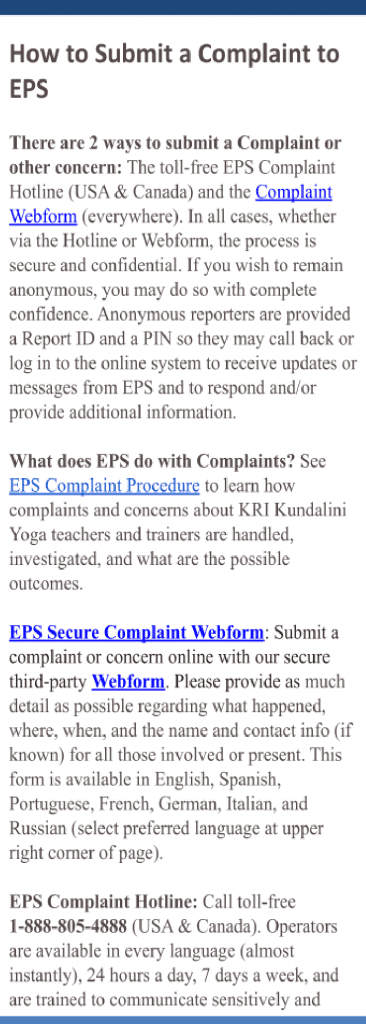
Understanding Power Imbalance in the Student-Teacher Relationship: A Yoga Students Guide
June 2022
Students may naturally have a desire to please or to not displease their yoga teachers. This desire contributes to the “power imbalance” that is inherent in all student-teacher relationships. The vast majority of yoga teachers are respectful of the ethics around such imbalance and maintain professional relationships with their students. This article is about how, in a student-teacher relationship, it is imperative for yoga students to understand their rights, the ethical boundaries Kundalini Yoga teachers are required to uphold, and what to do or where to go if you have a question, concern, or want to report a teacher’s misconduct.
Consider that every type of community has a spectrum of personalities, and this typically includes a small percentage of those who would use or exploit others for their own benefit. This type of personality is in a position to cause harm due to the greater trust and respect students typically give teachers. Even minor boundary violations can feel amplified for a student within the student-teacher relationship. It is important that students are empowered through understanding the potential for harm that arises from the power imbalance.
Where does power imbalance come from? A yoga teacher is not inherently more “powerful” than others. Rather, the students’ trust and their desire for guidance – their vulnerability – give the teacher more power and influence in the relationship. There is nothing wrong with this; we see healthy power imbalances literally everywhere and in all types of relationships.
When things go wrong: When this trust is not honored or respected by the teacher there is great potential for harm to the trusting student. Examples of crossing the line include personal, intimate/sexual, and financial exploitation.
A healthy student-teacher relationship is where the teacher honors the students’ trust and owns responsibility for and maintains ethical boundaries. This higher level of trust and susceptibility is the same trust implicit in doctor-patient, therapist-client, and minister-layperson relationships.
Because of this higher level of the student’s vulnerability and responsibility of the teacher, Kundalini Yoga Teachers are held to higher ethical standards than laws typically require, as encoded in the KRI Code of Ethics and Professional Conduct (the Code). The Code is in place to both protect students and the integrity of these teachings. Teachers may lose their teacher/trainer certification if it is shown they have violated the Code or any of its associated policies.
3HO, KRI, and the Office of Ethics and Professional Standards are committed to upholding the Code of Ethics and ensuring safe and respectful environments, free from discrimination and harassment, for all students who wish to practice Kundalini Yoga.
Understand your Rights: Read The 10 Rights of a Kundalini Yoga Student
Empowering Students
All participants in Kundalini Yoga and meditation are encouraged to become attuned to their own inner guidance, to practice critical thinking skills, and to engage in deep listening to body sensations and feelings. In the Kundalini Yoga tradition, this inner knowing is called Saibhung or self-sovereignty.
Boundaries can become blurred, or it can be confusing to know for sure if a violation has occurred. What can you do? Become familiar with signs of potential exploitation or of a teacher crossing ethical boundaries. Do not hesitate to ask questions, speak up, or take action when something doesn’t “feel right” or is “iffy.” If you experience any sign or sense of your personal boundaries – and/or the teacher’s responsibility to maintain professional boundaries – being violated, remember to step back, name it, and either get support or advice, or step out of the relationship.
The following sections provide descriptions of features or behaviors that can indicate a teacher’s crossing these boundaries. Keep in mind that one of these behaviors does not necessarily indicate a problem, nor do all behaviors need to be present in order to conclude that an abuse of power has occurred.
Signs of Misuse/Abuse of Power
Disrespectful and/or Discriminatory Behavior (note: See the KRI Anti-Harassment and Non-Retaliation policy for more information.)
Some types of abuse of power or crossing ethical boundaries are exploitation, harassment of any kind, and discrimination. Signs include:
- The teacher talks disrespectfully regarding your personal beliefs or identity.
- The teacher intentionally puts down or disrespects your (or anyone’s) lifestyle choices.
- The teacher’s language, jokes, or disrespect of others makes you feel uncomfortable.
- You feel the teacher is pursuing you or has harassing behaviors toward you.
- You reported the teacher’s behavior to the studio owner, and now are feeling harassed or retaliated against by the teacher or ostracized from groups or conversations.
As a student you should never be placed in a position where you feel as though you must tolerate inappropriate behavior or comply with inappropriate requests in order to remain in the yoga community or to be included and supported in your yoga practice.
Simply stated, if a yoga teacher or trainer asks you to do something that makes you feel even slightly uncomfortable, you should never feel as though you must comply.
Inappropriate Requests and Inappropriately Intimate Behaviors (note: See the KRI Respectful Student-Teacher Relationships policy for more information.)
Note that due to the spiritual context of yoga, it can be difficult to pinpoint what is inappropriate. Concrete examples include but are not limited to:
- You feel pressured to engage in activities with the teacher that are outside of the boundaries of healthy student-teacher relationships.
- You notice the teacher relates to you in an overly familiar way. You might notice yourself feeling flattered, “love-bombed,” or that you have a special relationship with the teacher.
- You are requested to help at the yoga studio as a work exchange for “free classes” but the hours you are asked to work end up exceeding what you agreed to and are unfair.
- You feel pressured to participate in social gatherings or volunteer activities where if you don’t participate you will be excluded from the group or seen as less committed than those who do participate.
- There is pressure to purchase items or enroll in events/workshops from the teacher’s repertoire. Those who purchase will gain some special benefit, and those who don’t will lose out in some way.
- The teacher requests personal favors from you or some one-on-one time with you, and you notice how it makes you feel acknowledged and “special.”
- The teacher comments about your physical appearance, asks about your love life, or makes flirtatious or other comments with sexual undertones.
Grooming a Student for a Sexual or Romantic “Relationship”
Although most yoga teachers have good intentions and abide by the Code of Ethics, students should be cautious of deliberate attempts to groom them. Grooming is where behaviors very close to boundary crossing (or “small” boundary crossings) occur that make the student feel special, loved, more attached to the teacher, and desirous of their attention. The behaviors become normalized and gradually increase in severity, steering the relationship toward sexual intimacy. Grooming techniques include:
- Touching, asking for hugs, putting arm around you, brushing against you.
- The teacher is very kind and understanding toward you, with flattering language. You may find yourself blushing and wondering about what’s happening.
- Asking personal favors of you, giving you “seva” opportunities to “serve” the teacher.
- Giving you gifts or special treatment, perhaps in return for personal favors.
- Telling you that you are special, you have a special light, aura, or energy; or that the two of you have a special bond.
- Offering you “healing” treatments, 1:1 yoga sessions, or “counseling,” which may start out “fine” but increasingly involve touch that feels sexual or inappropriate.
- The touch is explained as a part of the healing treatment and necessary for your wellbeing, that you need to relax and let go.
- Telling you that no one else will understand your relationship and to keep it secret.
The KRI Code of Ethics for Kundalini Yoga Teachers is very clear that sexual harassment and all sexual/personal/romantic relationships with a student, even if consensual, are wrong and a serious violation of the Code.
The Office of Ethics and Professional Standards (EPS) asks you to assist in creating an environment built upon the principles of mutual respect and free from discrimination and harassment by carefully attending to and reporting instances of misuse or abuse of power within a student-teacher relationship or any other misconduct/violation of the Code by a teacher.
You are encouraged to contact EPS even if you simply have a question or are uncertain about leadership behavior in your community. You can speak anonymously and decide if you wish to settle the issue locally with support or if you wish to submit a complaint to EPS. Complaints can be filed anonymously.

For general ethics questions or concerns:
Email to [email protected]
EPS Complaint Webform: https://www.3ho.org/article/10-rights-of-a-kundalini-yoga-student/
EPS Complaint Procedure information: https://epsweb.org/complaint-procedures/
KRI Code of Ethics & Professional Conduct and associated policies: https://kundaliniresearchinstitute.org/code-of-ethics/
10 Rights of a Kundalini Yoga Student:
For Print versions, include 10 Rights below (otherwise there is link in “Understand your Rights” text above).
URL: https://www.3ho.org/article/10-rights-of-a-kundalini-yoga-student/
10 Rights of a Kundalini Yoga Student
- To have a safe, clean, and welcoming class environment.
- To be treated with kindness, respect, and honesty.
- To be treated equally with other students, without discrimination.
- To freely choose where, and with whom, you study Kundalini Yoga.
- To receive the teachings of Kundalini Yoga.
- To practice Kundalini Yoga and Meditation at your level of comfort, capacity and self-care while respecting the needs of others.
- To have a Student-Teacher relationship that is professional, respectful and graceful.
- To practice Kundalini Yoga free of personal, sexual, financial, religious or political pressure from your Teacher.
- To respectfully ask questions or raise issues of concern or complaint, openly or anonymously, and receive honest answers and fair consideration without fear of ridicule or retaliation.
- To enjoy your Kundalini Yoga journey!
Ask EPS… If you have a question or topic you would like EPS to talk about, let us know!
Click here to visit EPS Official Website
Click here to follow EPS on Instagram
Click here to follow EPS on Facebook
Teacher
KRI is a non-profit organization that holds the teachings of Yogi Bhajan and provides accessible and relevant resources to teachers and students of Kundalini Yoga.


 Français
Français Deutsch
Deutsch Italiano
Italiano Português
Português Español
Español 简体中文
简体中文
More Related Blogs